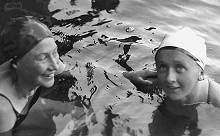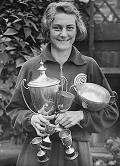Berlin Olympics 1936 A serious question mark hung over the Berlin Olympics of 1936. The politics of racism that were an inherent part of Adolph Hitler’s Germany led to threats of a boycott of the Games. IOC member Avery Brundage visited Germany to see if international law was being upheld and if people were being oppressed. On his return, Brundage declared that the Games should go ahead. He held the view that the IOC should not interfere with the politics of a host nation. The Germans had taken steps to include a Jewish athlete in its Summer Olympic team - Helene Mayer the fencer - but life for other Jewish athletes was less tolerable. Despite that, the decision was made to keep the Games in Germany. The Opening Ceremony of the Berlin Games was attended by the women featured in ‘A Proper Spectacle and several feature in the famous Leni Riefenstahl film of the ‘36 Games ‘Olympia’. Women athletes from all over the world have strong recollections of the event. The teams waited outside the stadium for several hours before the parade of nations began. It was a very hot day, but the uncomfortable wait was to give the teams an opportunity to meet with Chancellor Hitler. The Australian team had just four women and their swimmer, Pat Norton remembers:
"We had to wait in the polo ground for Hitler to enter - the teams were lined up either side. The diplomats came through, some countries gave the salute, but we were told not to. As he went into the stadium you would have thought God had come down from heaven."
"When the march into the stadium was arranged we were a total disgrace. First about thirty or forty non-members of the team, fat, with cigarette ashes on their clothes, marched at the head of the team. Then came the chaperones. I had to produce my passport. I was 29 years of age and too old to march with the athletes. They made me march with the chaperones." The Opening Ceremony was presided over by Adolph Hitler who formally opened the Games. The huge Bell tolled while thousands of carrier pigeons were released. The airship Hindenburg flew over the stadium, adorned with Olympic rings and swastikas, as the German team began their march past. The 1896 marathon winner, Spyros Louis, presented Hitler with an olive branch from Olympia as a symbol of peace and friendship. The Greek team had a single woman athlete, Domnitsa Lanitis: "In Berlin we Greeks were especially honoured coming from the mother country of the Olympics, but this did not make us blind to the fascist regime and the many showy majestic festivities which tried to show the world Germany’s strength! I will never forget the athletic parade in the Berlin Stadium where the Greek team - as always - entered first and was saluted with great enthusiasm, and the coming into the stadium of the last torch bearer with the Olympic flame. I will never forget my emotion and pride at that moment, but I wished that it was not Hitler and his regime that had the inspiration of the Olympic torch relay!" Pat Norton: "The torch was due to arrive in the stadium at a precise time. It was only ten minutes late, a wonderful feat! It was quite a sight to see the torchbearer running into the stadium, torch held high and the flame streaming in the breeze. Standing high in the stadium, silhouetted against the skyline, he raised the torch and with a deliberate movement plunged it into the bowl. Instantly the flame flared up into the sky, and with Hitler’s declaration the games were to begin." After the ceremony the men dispersed to the buses for transportation back to the Olympic village, and the women returned to their dormitory, Friesenhaus, on foot to await their events over the next ten days. |

